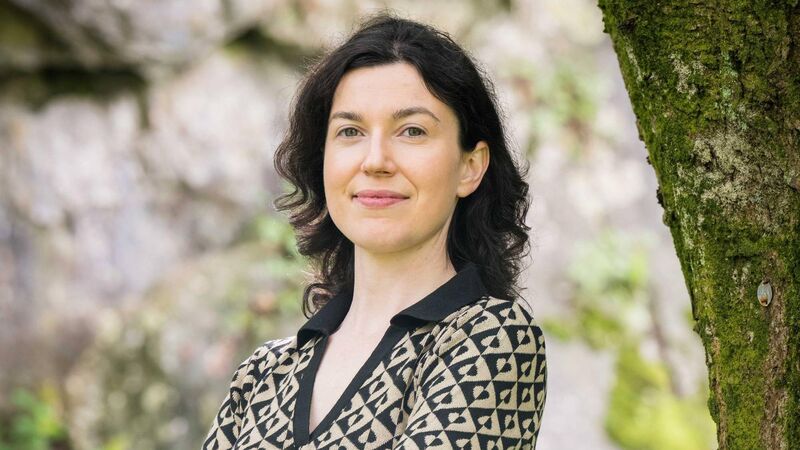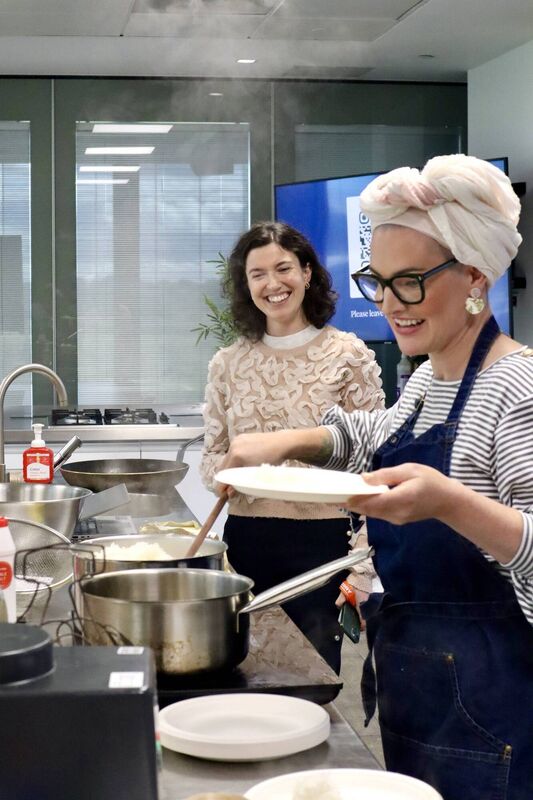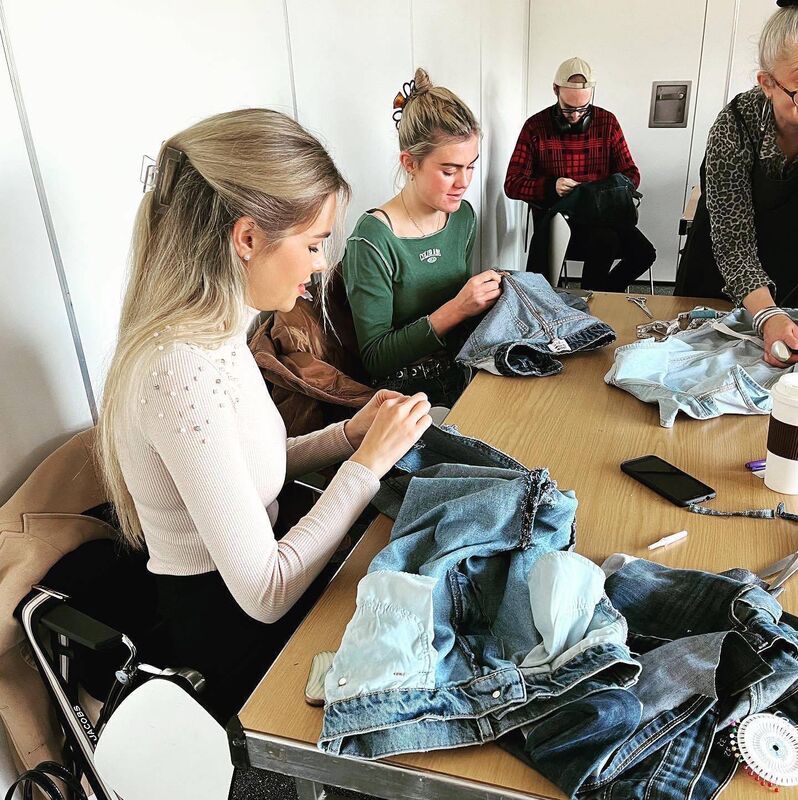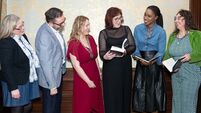WoW Bites: Cork woman on a mission to change the way we think about food, fashion and tech

LEFT: Ailís when she won Best Pitch Award & Best Plan Award at the IGNITE UCC Awards and Showcase in 2024. Picture: Joleen Cronin
No matter who we are or what we do, striving to be more sustainable is part of everyday life.
But what does it mean, and how do we know if we are in fact being more sustainable?
Ailís Crowley is the founder of FASH Forward, a consultancy helping people and businesses to understand how to act on sustainability and transform workplace culture with measurable benefits.
And it all started with discarded rice bags in Sri Lanka.
Graduating with a degree in International Commerce from UCC in 2014, Ailís left Cork for London where she worked in sales and marketing for seven years with Yahoo before becoming their sustainability champion.
“I was getting lots of questions from clients on how Yahoo is being sustainable,” says Ailís, who recognised this was a growing area of interest.
She moved back to Cork and signed up to study a postgraduate diploma in Sustainability in Business.

Meanwhile, on a visit to Sri Lanka, Ailís stumbled upon a business called Rice & Carry transforming discarded rice sacks into fashion accessories.
“They were collecting colourful rice sacks dumped on beaches. To anyone, they might just look like waste, but to the founders of Rice & Carry, they were something more.
“They loved the colours of the rice sacks and prepared them to be reused and upcycled into weekend bags, yoga bags and other fashion accessories.
“It was a real penny drop moment for me,” says Ailís. “With that level of resourcefulness and creativity, I wondered if it could be applied to all waste? That was my starting point into exploring sustainability.”
FASH Forward began with fashion (hence the name), but soon expanded into food and technology.
Like fashion, food and tech are great levers for engaging people in the circular economy idea because, says Ailís, these are things we connect with every day, making it easier to explain the use of resources, the importance and value of keeping those resources in circulation.
Ailís then signed up to UCC’s IGNITE Accelerator Programme for graduate entrepreneurs to turn their idea into a successful business.
“I wanted to engage people in sustainability through practical workshops on repairing, upcycling and zero waste. The workshops were largely focused on fashion originally, but during the IGNITE programme at the customer discovery phase, Kerry Foods said they’d like to engage their staff around zero food waste. They asked could I create a workshop for that because it aligned more with their mission, vision and values than a fashion workshop.
“That’s how the FASH Forward Zero Waste Food Workshop came to life.”
In delivering the Zero Waste Food Workshop, Ailís engages zero food waste chef Orla McAndrew to demonstrate simple ways to reduce food waste in the home with hacks for shopping, storage, cooking and using leftovers, and these are booked by companies for their employees.
“Businesses we do zero food waste workshops with tend to be larger with big teams and want to engage their staff in a fun, practical way that aligns with their values on sustainability,” says Ailís.
“We deliver them in person with Orla as the facilitator, but we have also developed a virtual workshop to reach teams working across multiple locations, making it even more accessible for people to learn about the importance of minimising food waste.”
Sustainability has become a core component of the package employers offer to attract and retain staff.
“We’re finding Gen-Z and Millennials want to work for businesses that align with their values,” says Ailís. “Our research shows us that oftentimes we’re brought in to align with the values of those employees who really want to learn and feel part of sustainable solutions. We really resonate with those audiences.”
Where once the package was focused on annual leave, pension and healthcare, now a values-driven approach determines how successful a business is in recruiting and retaining staff, and sustainability is part of that approach.
“Businesses tell us this comes up at interview stage a lot. Candidates ask how are you being sustainable; what’s the culture like? It’s definitely driven by talent acquisition and retention.”
Ailís has found that fits perfectly with why she created FASH Forward to begin with.
“I wanted to engage and inspire people in sustainable choices, behaviour change and doing the right thing for the environment, but I had to figure out why a business wanted that for their employees. Yes, employees were giving it great feedback, and they really love being part of our workshops, but there had to be more to it than that. Why the budget was available for it; that took a while to figure out.”
The workshops are fun and allow people to take an active role in creating a more sustainable life. But Ailís also enjoys being among the weeds, working one-to-one with smaller businesses, and there are lots of grants available that cover the cost of an expert like Ailís.
“Micro-enterprises and SMEs tend to work with me more on a consultancy basis rather than workshops, usually through an LEO Green For Business grant. This is where a food business can get two days’ sustainability consultancy for free to the value of €1,800,” explains Ailís.
“What I focus on during those days is waste, but I also look at other areas depending on the carbon footprint of that business. If energy is high on their carbon footprint, we’ll focus on energy, but if the footprint is highest around waste, we’ll focus on that.”
Action on waste can be as simple as incorporating a compost bin and making improvements in segregating waste.

“General waste has the highest cost for collection compared to a compost bin, and by segregating out food waste we can start tracking it. If waste is being collected by a commercial waste company, a business can request a regular weigh report.
“Once food waste is tracked, we can look at the source of the waste. Is it menu size? Maybe there is too much diversity on a menu, leading to food being thrown out because a dish isn’t being chosen regularly. Is it portion size? Is food coming back on plates? What other reasons lead to food going to waste?”
Once you know what the problem is, where it’s happening and why, it’s much easier to make changes and measure the benefit of those changes.
Ailís worked with On The Pig’s Back café in Douglas on exactly this.
“They will save an estimated 1.2 tonne of raw fruit and veg scraps and coffee grounds from waste by composting on site,” says Ailís. “They have also saved €330 on their waste bill because of the reduced number of general waste bin collections by adding the compost bin for cooked food, which can’t be used for the on-site composting.”
It’s a triple whammy: turning raw fruit and veg scraps into compost that can be used to grow vegetables for use in the café, reduced emissions by diverting waste from landfill, and saving money – a priority for every food business. “That really engages staff in the value of correct segregation and the why behind composting. They can see the value in it,” says Ailís.
“My aim is to make it as easy as possible for a business to do the right thing for the environment, but for it also to make business sense. By the end of a project, my aim is to have reduced cost for the business in some way, reduced emissions, but also have an inspiring story to share with staff on the outcome of the project.”
As well as LEO’s Green For Business grant, there are other supports available to businesses to bring in experts like Ailís to support small businesses on their sustainability journey.
“Clients of Enterprise Ireland can avail of a Climate Action Voucher, which provides for two days of fully funded consultancy for businesses looking to enhance their sustainability credentials or reputation,” says Ailís.
One example of the benefits this work can bring is a company who were a long-time customer of Electric Ireland on a non-green blended mix fuel tariff.
“We made a few phone calls and found SSE have a 100% renewable tariff. There was an estimated €12,000 in saving by switching. That change reduced cost, reduced emissions by running on 100% renewable energy, was of no cost, and saved them money.”
However, Ailís says there is still a lack of awareness within businesses that supports are available to them, and that FASH Forward is primed and ready to help.
“There are fantastic supports, but it’s for businesses to know about them and to understand that they’re quite easy to get,” says Ailís. “A Green For Business grant takes about 40 minutes to apply for, but a sustainability consultant like me could easily help with that. There could be more shouting from the rooftops on the supports because there’s an appetite there for it.
“Another support is an Energy Efficiency Grant which, following Green For Business, a sustainability consultant can find opportunities to upgrade outdated equipment. For example, LED lighting or waste management measures like anaerobic digesters are covered under this grant, which is up to €10,000 and the LEO will cover 75% of that. It’s an amazing resource.
“Recently, a business was changing its coffee machine to a more efficient model. The machine came to around €13,000, LEO covered 75% of that up to €10,000.”
In business today, margins are fine so any opportunity to acquire an edge over a competitor is welcomed; especially when it comes to upping sustainability credentials.
“Most people who work in sustainability are passionate about it, so bringing that energy to a project seems to resonate with businesses I work with. Something I really value is the client being happy with the work I do for them. I want to work with clients so they get value from a sustainability project and if they needed sustainability work again in the future they think of me.”
For food and hospitality businesses, the next step on from segregating and reducing food waste is tackling avoidable food waste.
“There’s a need to train chefs to understand how to use the whole vegetable; how to store to maximise shelf life, labelling, etc. At FASH Forward, we are developing training that’s accessible for business at scale to train chefs to minimise the avoidable food waste and highlight the cost benefit minimising food waste will bring.”
Sustainability can be addictive! The more you do, the more benefits you see, and the greater the drive to do more.
FASH Forward has set itself a goal to save 1,000,000 items from landfill by 2030.
“We estimate we’re saving 256,000 items for businesses and individuals we’ve worked with so far. We still have a way to go, but we’re happy with progress to date. Working with more businesses to reduce waste and empower more individuals with repair, upcycling and zero waste skills, I think we’ll be well on our way to reach our goal.”
- FASH Forward will be at Fuchsia Lane Farm, Co Tipperary, on October 7 for a regenerative tourism event, and at a Manufacturing & Supply Chain Conference at UL in November. See www.fashforward.ie







 App?
App?


